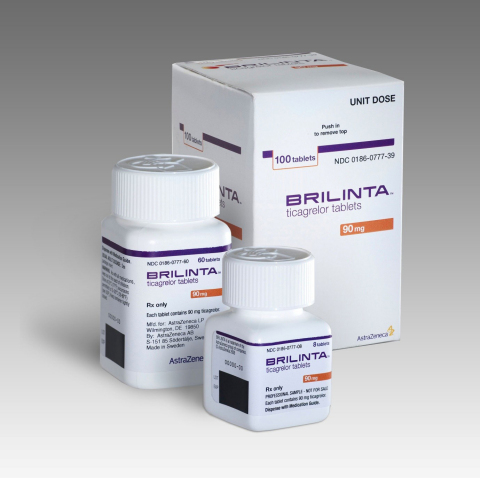 Brilinta is the trade name used for a drug which contains ticagrelor. Under the generic name of Ticagrelor, its trade name is Brilique and Possia in the EU. It inhibits platelet aggregation, which causes blood clotting in the blood vessels. It was approved for use in Europe in 2010 and by the US Food and Drug Administration in 2011.
Brilinta is the trade name used for a drug which contains ticagrelor. Under the generic name of Ticagrelor, its trade name is Brilique and Possia in the EU. It inhibits platelet aggregation, which causes blood clotting in the blood vessels. It was approved for use in Europe in 2010 and by the US Food and Drug Administration in 2011.
What Is Brilinta Used For?
Brilinta (ticagrelor) is a drug that prevents your blood platelets from clotting (coagulating). This helps prevent unwanted formation of blood clots that can block blood vessels in the heart, brain, and other parts of the body.
Ticagrelor is often used in combination with aspirin in low doses to prevent heart attacks and strokes in people who have heart problems or those who undergo heart surgery. Aside from these common uses, Brilinta may be used for other purposes which are not listed here.
How to Use Brilinta
- Take ticagrelor only as prescribed by the doctor. Follow Brilinta dosing on the prescription label. Avoid taking it in smaller or larger amounts or using it longer than your doctor’s recommendations.
- Ticagrelor should be taken with aspirin. Take aspirin doses according to your doctor's instructions.
- Take Brilinta at approximately the same time each day,with or without food.
- Take note that ticagrelor can make you bleed easily even with minor injuries, since it keeps your blood from clotting. Contact a doctor or seek medical attention immediately if bleeding does not stop.
- Inform your doctor, surgeon or dentist that you are taking ticagrelor and aspirin if you are being scheduled for a surgical or dental procedure. You will be asked to stop taking it for about one week before the procedure to prevent excess bleeding.
- Use Brilinta regularly. Do not stop usingticagrelor unless your doctor instructs you to do so, since it may raise your risk of developing a heart attack or a stroke.
Brilinta Dosing
Initiate treatment by taking a loading dose of 180 mg (2 tablets of 90-mg tabs). Continue your treatment with one 90-mg tablet twice daily.
Take aspirin at 325 mg (loading dose), and use with Brilinta at a daily maintenance dose of 75 to100 mg.
What to Do If You Miss a Dose
Take your usual Brilinta dosing as soon as you remember. However, you can skip your missed dose if it is time for your next dose. Don’t take extra Brilinta to make up for your missed dose.
What to Do If You Overdose
Seek medical attention immediately or call 1-800-222-1222 (Poison Help line). Overdosing on Brilinta can lead to excessive bleeding.
Brilinta Side Effects
Common side effects of Brilinta include the following:
- Shortness of breath
- Headache
- Dizziness
- Nausea
- Nosebleed
Consult your doctor if these side effects continue or worsen. Although most people using Brilinta do not experience serious adverse effects, some have experienced easy bruising, severe bleeding, bloody or black stools, blood in vomit or bloody urine. Tell your physician immediately if any of these occurs.
Serious allergic reactions to Brilinta are rare. However, see a doctor immediately if you experience sudden onset of rashes, itching, swelling of the face/throat/tongue, trouble breathing, and severe dizziness.
Other situations where you should call your doctor include:
- Pink or red urine
- Sudden weakness or numbness, especially if it’s only on one side of the body
- Chest heaviness or pain, or pain that spreads to the arm or shoulder
- Confusion, sudden severe headache, vision problems, or balance issues
Precautions for Taking Brilinta
Do not use Brilinta if you have:
- Scheduled surgery
- Allergies to ticagrelor
- Liver disease
- Stomach ulcers
- Active bleeding
- Bleeding disorder
- History of bleeding in brain (ex. stroke, head injury)
Inform your doctor if you are planning to become pregnant or may be pregnant while using Brilinta.
While using Brilinta, you must avoid:
- Taking non-steroidal anti-inflammatory drugs (NSAIDs) such as celecoxib (Celebrex), ibuprofen (Motrin,Advil), naproxen (Aleve), diclofenac, meloxicam, indomethacin, and others without your physician’s advice.
- Activities that increase your risk of injury or bleeding. Use extra precaution while brushing your teeth or shaving to prevent bleeding.
- Drinking alcohol, which increases your risk of gastrointestinal bleeding.
Ask your doctor before using any medications for colds, allergy, or pain, which may contain aspirin. Check medication labels to see if they contain aspirin (often written as ASA).
Note:
Store your medications at room temperature and keep them away from heat and moisture.
To see the complete list of precautions to take, click here.
